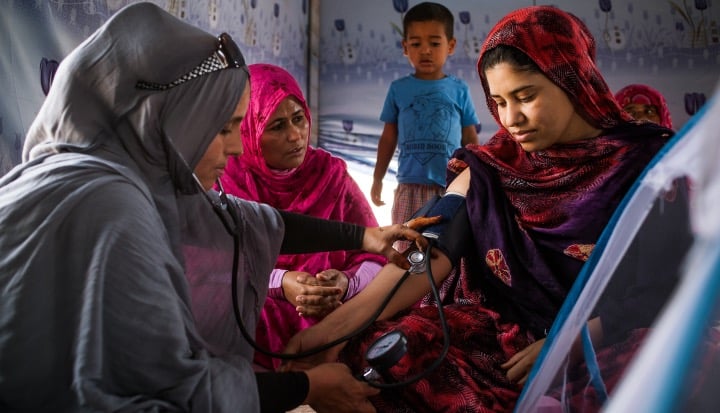Delivering a Healthier Future: Business’s Strategic Role in Advancing Women, Children, and Adolescents’ Wellbeing

A clear link exists between economic prosperity and the health of women, children, and adolescents. For business, engaging in global health is not only a moral obligation but also aligns with strategic economic decisions that promote gender equality, enhance economic growth, and build prosperous societies.
However, there are numerous challenges to achieving improved health, particularly in low-and middle-income countries. Many health systems were already stretched and under-funded before COVID-19, and are under increasing pressure from the effects of climate change, conflict and a tough economic climate.
Last week, Business Fights Poverty convened an online written discussion to explore what business can do to improve the health of women, children and young people, particularly in low- and middle- income countries (LMICs). This conversation, which is part of Business Fights Poverty’s collaboration to support the Global Financing Facility for Women, Children, and Adolescents (GFF)’s Deliver the Future campaign, focused on how the private sector can put its full weight behind global efforts to strengthen health systems. We discussed how companies can lean in, through innovation, partnership and expanding financial investment.
1. Leveraging core business capabilities to improve workforce and community nutrition
Businesses in any sector can play a crucial role in enhancing health and, in particular, nutrition for their workforce and communities. A study across 19 countries found that workforce malnutrition impacts productivity and economic stability. Initiatives such as Workforce Nutrition Alliance and Impact4Nutrition engage employers so that workers have access to and information about healthy nutrition, breastfeeding support and nutrition-focused health checks. Companies like Unilever and Olam are making commitments to roll out health and nutrition programs like these to all their workers.
Furthermore, businesses should have a holistic view of health and nutrition that goes beyond their employees and extends into the communities where they operate. The Assam’s Healthy Line Shop model, which uses efficient supply chain management to ensure broad distribution of vital health and nutritional products, serves as a strong example of this.
2. Addressing Accessibility, Affordability, and Equity in Healthcare
Addressing accessibility, affordability, and equity in healthcare, especially in disadvantaged and remote areas, is crucial. Digital technology can play a significant role in addressing these issues. For example, Vodafone Foundation’s m-mama initiative has shown how digital technology, combined with government efforts, can significantly reduce maternal and newborn mortality by enabling timely emergency healthcare transport in remote areas. Additionally, digital platforms like YLab’s CyberRwanda and Tegura Ejo Heza have been instrumental in promoting health, livelihood education, and mental health literacy among adolescents.
Community Health Workers (CHWs) and community-run primary healthcare centers are crucial in delivering healthcare to rural and underserved areas. Investment in CHWs not only enhances healthcare delivery but also addresses gender and equity issues within the health workforce, thereby requiring specific financial and policy support.
3. Supporting Primary Healthcare Systems and Healthcare Workers
The ongoing stress on several countries’ health systems is worsened by limited economic resources, hindering governments’ ability to invest in healthcare and close the substantial annual funding gap for maternal, newborn, child, and adolescent health. Funds like the Global Financing Facility (GFF) are pivotal in catalyzing investments from organizations like the World Bank to enhance effective interventions and implement national health plans for women and child health.
Ensuring clear regulation, trust, transparency, grant capital, and mechanisms to reduce risks in private sector investment is vital to encourage private sector engagement in health investments. Moreover, larger organizations can support local innovations by collaborating with smaller entities, especially those poised to drive quick, impactful change.
Join the Mission to Deliver a Healthier Future
With women making up 40% of the global workforce, and children growing up to be the workforce of the future, their health is absolutely an issue for business. Furthermore, it was clear from the discussion that you don’t have to work in the medical or pharmaceutical field to take action on improving the health of women, children and young people. Companies with global supply chains, tech and communications companies, those in agriculture, transport, logistics, education, insurance and finance (to name but a few) have an important role to play, bringing their own specific expertise, networks and advocacy voice to deliver a healthier and more resilient future.
Editor’s note: Business Fights Poverty are currently running a collaboration with the Global Financing Facility, on Delivering Healthier Futures for Women, Children and Adolescents: What is the Role of Business? We warmly invite you to participate, to share your experience, to spread the word about GFF’s #DeliverTheFuture campaign, and to connect with others who are working on this important topic. Find out more here.
Download the full insights summary
WITH THANKS TO OUR EXPERT PANEL: We are very grateful to each of the contributors to this Online Written Discussion:
- Emily Carey, Senior Health Systems Adviser, NHS Consortium on Global Health
- Aishwarya Choubey, Senior Associate, Global Alliance for Improved Nutrition
- Colleen Connell, Managing Director, Health Finance Coalition
- Philip Eisenhart, Communications Lead, Access to Nutrition Initiative
- Lisa Felton, Vodafone Group Foundation Director, Vodafone Foundation
- Dr Samson Gwer, Executive Director, Afya Research Africa
- Brendan Hayes, Senior Health Specialist, Global Financing Facility for Women, Children and Adolescents
- Sabina Hyseni, Global Lead, Health Advocacy with Business, Private Fundraising and Partnerships, UNICEF
- Tania Lessenka-Teodosiev, Project Manager and Senior Analyst, Endeva
- Natacha Mugeni, Digital Health Director, YLabs
- Ruth Munyinyi, Senior Associate-SUN Business Network; Global Partnerships, Global Alliance for Improved Nutrition
- Camilla De Nardi, Private Sector Partnerships Advisor, Global Alliance for Improved Nutrition










